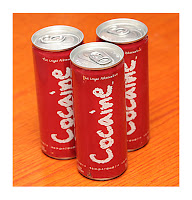Free Download
The Voice of the Underdog®
Chapter 1
I’m not a big fan of Cocaine, but I respect the bold marketing strategy behind it. And the distribution is impressive, too. I was stunned to find it in an East Texas country gas station last weekend. I picked some up just for grins. I might resell it on eBay.
 Of course, I’m not talking about the illegal drug. I’m referring to the energy drink marketed by ReDux Beverages that was recently renamed after the company received a warning letter from
Of course, I’m not talking about the illegal drug. I’m referring to the energy drink marketed by ReDux Beverages that was recently renamed after the company received a warning letter from
the FDA. And therein lies the strategic brilliance. I don’t like this energy drink or its premise. But Cocaine does offer an interesting lesson in challenger brand marketing.
 With the introduction of Red Bull in 1997, the energy drink segment exploded and now includes a long list of competitive products from a bevy of beverage players. One strategy for competing in a segment like this is to create it. That’s what Red Bull did. Where there was none, they made one. Today they still enjoy nearly 50 percent market share in the segment they invented, and they accomplished an impressive feat in the process—they caught both category killers Coke and Pepsi asleep in their captain’s chairs. But since each segment can have only one creator, those who come later must find some other way to stand out.
With the introduction of Red Bull in 1997, the energy drink segment exploded and now includes a long list of competitive products from a bevy of beverage players. One strategy for competing in a segment like this is to create it. That’s what Red Bull did. Where there was none, they made one. Today they still enjoy nearly 50 percent market share in the segment they invented, and they accomplished an impressive feat in the process—they caught both category killers Coke and Pepsi asleep in their captain’s chairs. But since each segment can have only one creator, those who come later must find some other way to stand out.
The people behind Cocaine accomplished this by embracing an important challenger brand credo: Sacrifice. They sacrificed broad appeal and acceptance by boldly associating their product with an illicit drug in order to build an even stronger bond with a smaller group of … ahem … users. In fact, this company went even further than sacrifice by inviting and then embracing controversy. Certainly, they understood that it is far better to be irreverent than irrelevant.
But the product name was, indeed, an association based at least loosely on product features that included more than four times the amount of stimulants like caffeine, taurine, and vitamins B12 and B6 than competitive offerings. ReDux promoted their Cocaine drink as “The Legal Alternative” to the real deal. I could tell just by looking at the nutritional numbers on the side of the can that it wasn’t for me. But my buddy had to drink one just to see. He said it burned his throat and gave him a stomach ache. But for 20-something males with cast iron guts and a need for speed, this product is right on the money. And the naming is sure to have added an element of controversy that helped leverage what had to be a miniscule national marketing budget.
And that’s when the FDA played right into the marketing plan. I am convinced that the people at ReDux knew the FDA or some other authority would come knocking. It doesn’t take a law degree to figure that out. In fact, I’m certain they were counting on some sort of public movement against the product’s name. And sure enough, that’s what happened. A simple Google search will turn up loads of articles and related publicity about the controversy generated by the product name and a letter from the FDA pressuring ReDux to change it or else.
And change it, they did. Now you’ll find the same product sold under the name “Censored,” a name with the “same rebellious and fun spirit,” according to the company’s attorney. And you’ll find it at that same East Texas country store where I bought Cocaine. Unless, of course, they’re sold out. The clerk at the station told me they have trouble keeping it in stock.
“The kids love the buzz it gives them,” he told me. And so, apparently, does ReDux.
We challenge underdog brands to think differently. We help them find their voice, and urge them to blaze new trails to make sure they stand out from the pack. Whether you need an agency of record or support on a project, we are here to help you win.